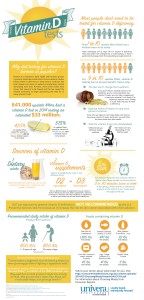Is Testing for Vitamin D Deficiency Really Necessary?
Is Testing for Vitamin D Deficiency Really Necessary?
Nearly nine out of 10 upstate New Yorkers have no medical reason to have their vitamin D levels tested, yet health care providers and patients continue to frequently request the test, according to a recent analysis by Univera Healthcare.
Vitamin D is often referred to as the miraculous sunshine vitamin because our bodies can usually produce all that we need throughout the year by spending a just few minutes out in the sun each week during the Spring, Summer and Fall. The vitamin helps our bodies absorb calcium, keeping our bones and muscles healthy and strong.
According to Univera, 641,000 upstate New Yorkers had their vitamins D levels tested last year, despite the fact that almost half of them had no medical indication it was needed. A vitamin D deficiency test can cost as much as $50 and last year in upstate New York about $33 million was spent on the test.
“Even with a medical indication to test for vitamin D deficiency, it’s valid to question the need for the test, because the outcome won’t necessarily change the treatment,” said Matthew Bartels, M.D., Univera Healthcare medical director for health care improvement. “If your doctor suspects a low vitamin D level, taking an over-the-counter supplement or getting more vitamin D from your diet may be sufficient.”
Aside from multivitamins and vitamin D supplements, cod liver oil, salmon and tuna are foods high in vitamin D. Milk, cereal and orange juice are fortified with vitamin D.
The American Society of Clinical Pathology notes that, “Many people have low levels of vitamin D, but few have seriously low levels. Most of us don’t need a vitamin D test. In keeping with the Choosing Wisely® initiative, making simple changes will provide most people with sufficient levels of vitamin D.”
Choosing Wisely is an American Board of Internal Medicine (ABIM) Foundation initiative that includes more than 300 care recommendations submitted by physician-led medical specialty societies to improve care and encourage conversations between physicians and patients about unnecessary services and those which may be harmful.
So how much vitamin D is needed? Bartels says 600 international units from food and supplements for those 70 years and younger and 800 international units for those older than age 70. “To ensure that you actually consume the recommended amount, it may not hurt to take a multivitamin or vitamin D supplement,” he said.
Univera’s goal in issuing its research of the necessity of vitamin D testing is to encourage informed discussions between patients and doctors.
View a complete library of Univera Healthcare reports and infographics on a variety of health care topics at the “news and information” section of www.univerahealthcare.com. Also see https://buffalohealthyliving.com/is-testing-for-vitamin-d-deficiency-really-necessary.










